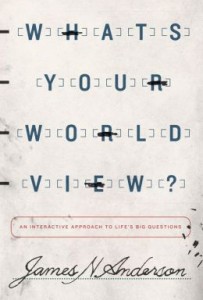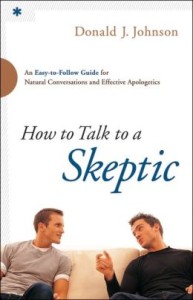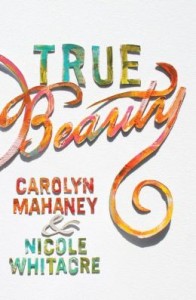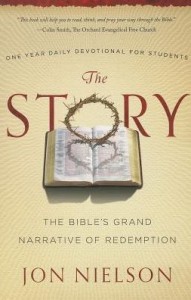If you have a high school or college graduate, you’re thinking about how fast time flies and how bittersweet the occasion of this very special young adult stretching his or her wings and flying out into the world. We think of all the things we should have told them and all the time that might have been put to better use, but sooner or later they have to start making decisions for themselves. Making mistakes, too–even if you’ve successfully taught them to avoid your mistakes they’ll make their own. But as they’re walking out the door you can still give them tools to help in decision-making and self-discovery. On Wednesday we looked at a series of books designed to build an intellectual scaffolding for Christian thought. Today, a roundup of new books that can help young people understand themselves and God’s plan for them. We’ll skip our usual rating system for these; all of them get top marks.
What’s Your Worldview? An Interactive Approach to Life’s Big Questions, by James N. Anderson.  Crossway, 2014, 112 pages.
Crossway, 2014, 112 pages.
I love this book’s format. Instead of marching through the major worldviews, describing their characteristics and mentioning some of the great thinkers associated with them, the author begins by asking questions. That’s a form of dialogue all Christians should cultivate, in my opinion: speaking for myself, I’m often too busy lining up arguments to stop and understand what the other person is really asking or thinking. The purpose of What’s Your Worldview? is expressed in the subtitle, and it serves first as a diagnostic tool for determining the reader’s own philosophical leanings. But its lasting value is in helping the student draw out the worldviews of friends, acquaintances, teachers, and others he or she is likely to encounter. Hence the questions in Part One: what do we believe about truth, knowledge, goodness, religion, God . . . and once we’ve established (or not) a belief in God, what sort of being is he, she, or it?
Part Two sorts the most likely answers into categories, and Part Three lists 21 major worldviews with their characteristics and weaknesses. (Spoiler alert! Christianity turns out to be the one that makes the most sense.) Here’s the fun part: the book is arranged like a “Choose Your Own Adventure” novel, in that the reader doesn’t read straight through, but jumps forward and back in the text depending on how he answers the questions. A “yes” answer to “Is everything material in nature?” leads to page 69, where the Materialist worldview is explained, with its peculiar strengths and weaknesses. A “no” answer leads to the next question, “Is everything ultimately mental in nature?” with its own page options. After each worldview, the reader is given a chance to reconsider by going back to the question page and choosing another answer. No worldview can be thoroughly explored in a book this short, but further resources are available on the Crossway website (URL provided). Footnotes are mostly Bible references, which serves to reinforce the Bible’s relevance to modern-day thought. Note: this book might be especially helpful for those kids who aren’t devoted readers.
How to Talk to a Skeptic: an Easy-to-Follow Guide for Natural Conversations and Effective Apologetics, by Donald J. Johnson. Bethany House, 2013, 264 pages.
 Let’s face it: we live in a hostile culture, and it’s getting more so all the time. This shouldn’t make us afraid; it should make us prayerful. And a little bit excited, even. God does great things in a hostile culture, and the darker the day, the brighter the light. But we’re called to be “wise as serpents” and “seasoned with salt”—in other words, effective communicators of the truth, to the best of our ability. This book shows how to share our faith in a more natural way than breaking into casual conversations with, “Do you know Jesus?” There are times when a question like that is exactly what’s called for, but the best witnessing is often within a relationship—the neighbor with the Darwin fish on her bumper, or (in a college context) the RA who carries around a copy of The God Delusion. A “skeptic,” as Johnson defines it, is anyone who isn’t sure Christianity is true or who is convinced that it isn’t. Skeptics will often come at us with ill-informed questions or false accusations, so the first step is backing up and getting to what the skeptic actually believes. This clears the way for an opportunity to contrast worldviews and demonstrate how Christianity answers life’s biggest questions in a satisfying and reasonable way.
Let’s face it: we live in a hostile culture, and it’s getting more so all the time. This shouldn’t make us afraid; it should make us prayerful. And a little bit excited, even. God does great things in a hostile culture, and the darker the day, the brighter the light. But we’re called to be “wise as serpents” and “seasoned with salt”—in other words, effective communicators of the truth, to the best of our ability. This book shows how to share our faith in a more natural way than breaking into casual conversations with, “Do you know Jesus?” There are times when a question like that is exactly what’s called for, but the best witnessing is often within a relationship—the neighbor with the Darwin fish on her bumper, or (in a college context) the RA who carries around a copy of The God Delusion. A “skeptic,” as Johnson defines it, is anyone who isn’t sure Christianity is true or who is convinced that it isn’t. Skeptics will often come at us with ill-informed questions or false accusations, so the first step is backing up and getting to what the skeptic actually believes. This clears the way for an opportunity to contrast worldviews and demonstrate how Christianity answers life’s biggest questions in a satisfying and reasonable way.
Those questions involve love, meaning, heaven and hell, law, the Bible, relationship, transcendent longing, and the two big problems today’s secularists have with the church (i.e., hypocrisy and sex). The author, who as a radio talk show host encounters these questions all the time, has had plenty of practice in side-stepping distractions and drawing callers into real conversations. His approach can work for casual encounters on a bus or plane as well as ongoing relationships. No style of apologetics is guaranteed to “work”—it’s the Holy Spirit who works. But prayerfully-planted seeds give Him something to work with.
True Beauty, by Carolyn Mahaney and Nicole Whitacre. Crossway, 2014, 125 pages.
Tom Wolfe’s novel I Am Charlotte Simmons tells how a sweet, bright, Christian girl from small-town North Carolina is eaten  alive by the ferocious sexual culture of an Ivy-League-style university. Charlotte might have benefited from this little book, which is not directed toward any particular age of womanhood, but is particularly helpful for the young lady beginning to gain a sense of herself and her worth. Women aged 16-26 are particularly vulnerable in today’s culture, which is why some Christian homeschool leaders advocate girls staying home until they’re married. Whether they leave or stay, young women need to know where “true beauty” is grounded.
alive by the ferocious sexual culture of an Ivy-League-style university. Charlotte might have benefited from this little book, which is not directed toward any particular age of womanhood, but is particularly helpful for the young lady beginning to gain a sense of herself and her worth. Women aged 16-26 are particularly vulnerable in today’s culture, which is why some Christian homeschool leaders advocate girls staying home until they’re married. Whether they leave or stay, young women need to know where “true beauty” is grounded.
We all know that we live in a culture obsessed with physical beauty, and the authors share some of their own struggles with body image, as well as those of acquaintances and correspondents. Sermons on the topic often zero in on I Peter 3:3 and take modesty as the theme, but that verse, as well as the remarkably similar I Timothy 2:9, have a lot more to say to us, and the implications are more positive than negative. The beauty of a Christian woman is found first in God, then in her heart and mind. Only then can she have a wholesome attitude toward physical beauty expressed in her body, clothes, attitude, and works. The chapter on trust should be especially helpful to a young woman facing a hopeful, scary, and uncertain future. I hope she reads it more than once.
The Story: the Bible’s Grand Narrative of Redemption (a One-Year Daily Devotional for Students), by Jon Neilson. P&R Publishing, 383 pages.
 At almost 400 pages, this is the heftiest book in today’s collection, but it comes back to the book we all started with. No young person should launch into adulthood without being grounded in personal Bible study, but tragically, many do—even those raised in Christian homes. In his preface, the author identifies his audience as students ages 15-21. He acknowledges it’s hard to get into a habit of daily Bible reading, partly because we forget two things: first, “The Bible is not just a book about God; the Bible is God speaking.” Also, “we forget that the Bible is not a collection of random books and writings; the Bible is one story.” Furthermore, it’s our story: the author reminds us that each reader has a place in the grand sweep of the redemption narrative.
At almost 400 pages, this is the heftiest book in today’s collection, but it comes back to the book we all started with. No young person should launch into adulthood without being grounded in personal Bible study, but tragically, many do—even those raised in Christian homes. In his preface, the author identifies his audience as students ages 15-21. He acknowledges it’s hard to get into a habit of daily Bible reading, partly because we forget two things: first, “The Bible is not just a book about God; the Bible is God speaking.” Also, “we forget that the Bible is not a collection of random books and writings; the Bible is one story.” Furthermore, it’s our story: the author reminds us that each reader has a place in the grand sweep of the redemption narrative.
The Story follows standard devotional-guide format, with scripture readings for every day of the year ranging from a few verses to two chapters. The readings don’t correspond to days of the calendar: just Day 1, Day 2, and so on through Day 366. A student could read one/per day for the whole year, or skip weekends, or read one every other day, or whatever works as long as it’s consistent and timely. The dramatic organizing structure of Five “Acts” emphasizes the One Story angle through some of its major characters: Adam to Abraham; Abraham to Samuel; Samuel to Exile; Exile to Jesus; and Jesus to the End. A page-length meditation for each scripture passage concludes with prayer suggestions. Many devotional guides are available for this age group, but I like the focus and intensity of this one. “Take up and read.”
For our previous graduation gift suggestions, go here and here, and check out our reviews of teen and student Bibles. Two years ago Emily interviewed Alex Chediak about his useful handbook, Thriving at College. And don’t miss our two-part interview with Gene Edward Veith on calling and vocation, beginning here.
Stay Up to Date!
Get the information you need to make wise choices about books for your children and teens.
Our weekly newsletter includes our latest reviews, related links from around the web, a featured book list, book trivia, and more. We never sell your information. You may unsubscribe at any time.
Support our writers and help keep Redeemed Reader ad-free by joining the Redeemed Reader Fellowship.
Stay Up to Date!
Get the information you need to make wise choices about books for your children and teens.
Our weekly newsletter includes our latest reviews, related links from around the web, a featured book list, book trivia, and more. We never sell your information. You may unsubscribe at any time.
We'd love to hear from you!
Our comments are now limited to our members (both Silver and Golden Key). Members, you just need to log in with your normal log-in credentials!
Not a member yet? You can join the Silver Key ($2.99/month) for a free 2-week trial. Cancel at any time. Find out more about membership here.



